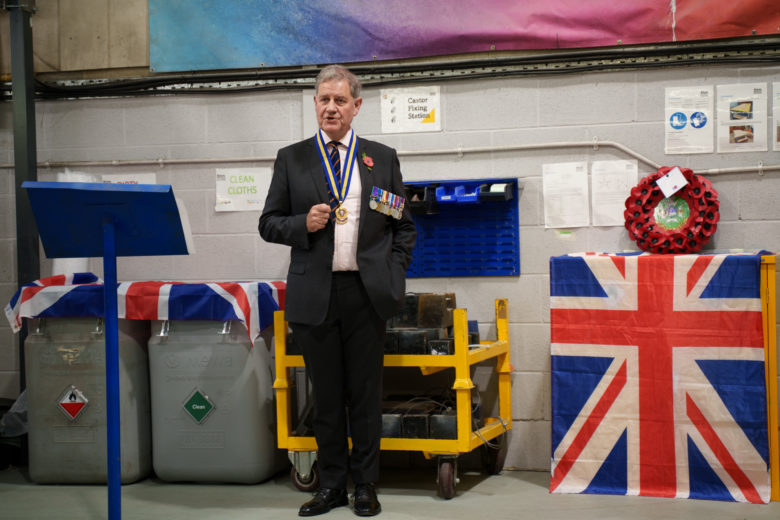Acres team marks Armistice Day – 11/11/25
The Acres team held a service to mark Armistice Day, with a moving service with Major (Ret.) Bruce Spencer.
The Armistice, an agreement to end the fighting of the First World War as a prelude to peace negotiations, began at 11am on 11 November 1918. Armistice is Latin for to stand (still) arms.
To this day we mark Armistice Day around the United Kingdom with a Two Minute Silence at 11am on the 11th day of the 11th month.
“They shall grow not old, as we that are left grow old;
Age shall not weary them, nor the years condemn.
At the going down of the sun and in the morning
We will remember them.”– This is For the Fallen, by Lawrence Binyon.
In the United Kingdom, Remembrance Day, also known as Armistice Day, is observed each year on the 11th of November. At 11 a.m., a moment of silence is held across the country to honour the lives of those lost in conflicts from World War I to modern-day peacekeeping missions. This tradition not only remembers the sacrifices of the past but also reinforces a commitment to peace and resilience for the future.
The history of Remembrance Day traces back to the end of World War I, which officially ceased on the 11th hour of the 11th day of the 11th month in 1918. The first official Remembrance Day was held in 1919, marking one year since the end of what was then known as “The Great War.” Since then, the act of observing silence on this day has been a defining symbol of national unity and respect in the UK. Originally intended to commemorate those who fell in WWI, its significance has expanded over time, now remembering all those who have served, including those in World War II, the Falklands War, and other conflicts where British forces were deployed.
One of the most iconic symbols of Remembrance in the UK is the red poppy, inspired by the famous poem “In Flanders Fields” by John McCrae. In 1921, the Royal British Legion began selling paper poppies to raise funds for veterans, a tradition that continues today. Each year, millions of people across the UK wear these bright red poppies as a mark of respect and solidarity, with all funds going to support the Armed Forces community.
Beyond the traditional acts of silence and the wearing of poppies, communities across the UK hold Remembrance services. The National Service of Remembrance at the Cenotaph in Whitehall, London, is one of the most widely recognised ceremonies. Attended by members of the Royal Family, government officials, military personnel, and thousands of citizens, it is a moving display of remembrance, respect, and gratitude.
Remembrance Day also provides a moment to reflect on the value of peace, resilience, and collective responsibility. For younger generations, it serves as a powerful lesson, reminding them that the peace and freedoms they experience today came at an immense cost. Schools often take this opportunity to educate students about the World Wars and the sacrifices made by young men and women, embedding the significance of Remembrance into the fabric of UK society.
In recent years, Remembrance has expanded to embrace inclusivity and global recognition. Tributes now include Commonwealth soldiers and other nationalities who served alongside British forces. By acknowledging the diverse backgrounds and heritages of those who fought, the UK recognizes the interconnectedness of global conflicts and the shared sacrifices made.
In essence, Remembrance in the UK is about honour, resilience, and unity. It’s a call to remember not just those who lost their lives in service but also the values for which they fought. As each year passes, the enduring significance of Remembrance Day speaks to the UK’s collective commitment to memory, respect, and the pursuit of a world where such sacrifices are never forgotten.

